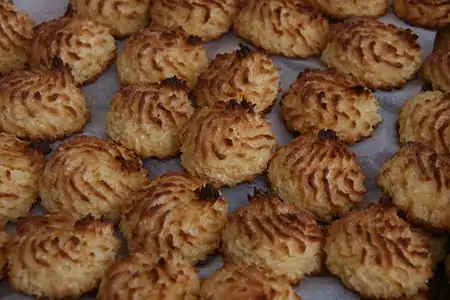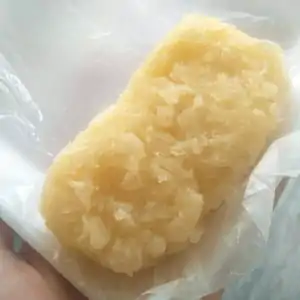Cocada
Cocada are a traditional coconut candy or confectionery found in many parts of Latin America. They are particularly popular in Argentina, Bolivia, Brazil, Colombia, Chile, Dominican Republic, Mexico, Panama, Venezuela, and Ecuador. They are oven baked but are served at room temperature to provide their chewy and soft texture. Made with eggs and shredded coconut, cocadas come in a variety of colors due to the modern use of food coloring,[1] however the traditional variations are golden brown. They are often garnished with almonds, either whole or chopped.[2] There are hundreds of cocadas recipes, from the typical hard, very sweet balls to cocadas that are almost the creamy texture of flan.[1] Other fruit, often dried, can be added to the cocadas to create variety, which will also lend to a wide spectrum of cocada colors.[3] Cocadas are mentioned as early as 1878 in Peru.[4]
 Cocadas from Ferrol, Spain. | |
| Type | Confectionery or candy |
|---|---|
| Place of origin | Mexico |
| Region or state | Latin America |
| Associated national cuisine | Argentina, Bolivia, Brazil, Colombia, Chile, Dominican Republic, Mexico, Panama, Venezuela, Ecuador. |
| Serving temperature | Room temperature |
| Main ingredients | Eggs, shredded coconut, food coloring, sugar, brown sugar, coconut milk, condensed milk, fruit syrup |
By country
Mexico, Colombia and Uruguay
In Colombia and Mexico, Conserva de coco are sold not only as artisan candies from shops, but commonly on the streets, out of baskets, and particularly on the beaches, by men or women who carry them on large aluminum trays.[5] In Uruguay, they are commonly sold in bakeries under the name of coquitos, the more delicate versions include a cherry on the top and syrup coating, sometimes they fill the boxes of assorted masas.
Brazil
In Brazil, cocada are a traditional confectionery originating from the north-east of the country. They are often long and thin rather than round, and are sold in the streets.
One variation of cocada in Brazil is the "black cocada" (Portuguese: Cocada preta) made with brown sugar and slightly burnt coconut. In Brazil, "rei da cocada preta" (black cocada king) is used to refer to an arrogant person who thinks too highly of himself.[6]
Although similar, cocadas and queijadinhas are not the same thing. The cocada is usually made from coconut and sugar only, rolled together to form an amorphous mass. Queijadinha is made with more ingredients, and gets its shape from the baking tin.
Venezuela
In Venezuela, conserva de coco is a candy and cocada is a drink blended with coconut and the confectionery or candy form is called "conserva de coco".
Gallery
.jpg.webp) Cocadas of Bogotá, Colombia.
Cocadas of Bogotá, Colombia. Cocadas of Costa Rica.
Cocadas of Costa Rica. Colombian cocadas in jars.
Colombian cocadas in jars. Golden brown cocadas.
Golden brown cocadas._Martha_Benez_Doces_-_Ara%C3%A7atuba_-_Cocada_de_sol_Romerito_Pontes_(15870097095).jpg.webp) Cocadas of Araçatuba, Brazil.
Cocadas of Araçatuba, Brazil. A cocada of Muriqui, Brazil.
A cocada of Muriqui, Brazil.
References
- Mounts, Deborah "Cocada Dessert Recipe" BellaOnline, accessed 5 March 2010
- "Cocada Dulce" in Spanish, accessed 5 March 2010
- Reichel-Dolmatoff, Gerardo and Reichel-Dolmatoff, Alicia (1961) The people of Aritama: the cultural personality of a Colombian mestizo village University of Chicago Press, Chicago, page 63, OCLC 1488921
- Raimondi, A. (1878) "Zur physikalischen Geographie von Peru - II" Globus 36: pp. 173-175 page 174, in German
- McCausland-Gallo, Patricia (2004) "Cocades Costeñas" Secrets of Colombian Cooking Hippocrene Books, New York, page 177, ISBN 0-7818-1025-6
- "De onde surgiu a expressão "rei da cocada preta"?" [Where did the expression "black cocada king" come from?]. Super Interessante (in Portuguese). 26 July 2017. Retrieved 5 October 2018.




.jpg.webp)




_01.JPG.webp)